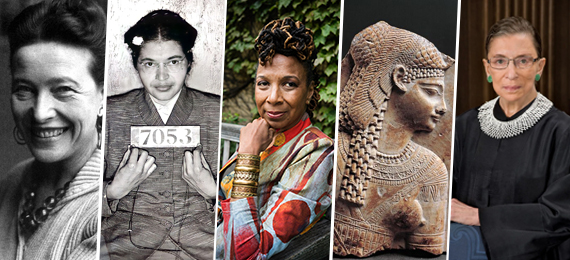
Cleopatra VII
Let’s start off with the most well-known figure in Greek and Egyptian political history – Cleopatra.
Known to be the final ruler of the Ptolemaic dynasty and the last active pharaoh, Cleopatra ensured that Egypt, as well as its capital Alexandria, thrived in culture and attracted scholars, artists, and philosophers from all over the world. Outside of Egypt, she is well remembered in Islamic traditions as a scholar and has statues honoring her.
Who coined the term ‘intersectionality’?
- A. Ruth Bader Ginsburg
- B. Simone de Beauvoir
- C. Kimberlé Crenshaw
- D. Rosa Parks
Most of us know Cleopatra for her tragic love triangle, luxurious living, and her untimely death. What we aren’t aware of is that she excelled in diplomatic gestures to other nations’ rulers and ensured her position in power. It was her diplomacy that gained her the throne from her co-ruler and brother, Ptolemy XIII. She had coins made, depicting her having a strong jawline like her father, thereby emphasizing her right to rule.Plutarch, the Greek biographer, claimed that more than her looks, it was Cleopatra’s intelligence that was the most compelling.
Simone de Beauvoir
A well-known French feminist, Simone de Beauvoir’s 1949 book ‘The Second Sex’ changed feminist discourse worldwide. Beauvoir’s writings focused on breaking female myths and patriarchal prejudice and setting precedent in feminist theories.
Rosa Parks
Most of us know about Rosa Parks and her defiant act in 1955 which spurred protests against racial segregation in the U.S. Parks was a prominent voice in the civil rights movement and continued fighting against injustice and discrimination in Detroit, till her death.
Parks was an African- American seamstress living in Montgomery, Alabama who refused to give up her seat in public transport for a white person. She recognized her power through a simple act of defiance.
She further mobilized the NAACP (National Association for the Advancement of Colored People) to boycott buses and drew national attention to the inhumane segregation laws of Southern states. This eventually led to segregation being ruled unconstitutional by the courts.
Ruth Bader Ginsburg
Known ardently as ‘Notorious RGB’, Ruth Bader Ginsburg transformed the legal landscape in the U.S, especially for women. Her commitment to the principle of equal rights made her one of the foremost feminist figures in the 20th century. Throughout her 27-year Supreme Court career Ginsburg fought for LGBTQIA+ rights, financial equality for women, civil rights for immigrants and undocumented people, rights for people with disability, and equality in education. Her power in wielding the U.S legal system to help minorities is inspirational for millions of women.
Kimberlé Crenshaw
The term ‘intersectionality’ which is key to 20th-century Gender and Sexuality studies around the world was coined by Kimberlé W. Crenshaw. She single-handedly changed the binary approach to viewing gender issues. Her foundational work in critical race theory and intersectionality threw light on simultaneous racial and gender prejudice.
She is a Law school professor and activist for civil rights, critical race theory, black feminist legal theory, racism, and law in the U.S. Her academic knowledge and groundbreaking work in the field of racial and gender prejudice were also influential in drafting the equality clause in the South African Constitution.